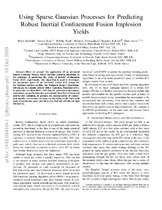| dc.contributor.author | Jarvis, Matt | |
| dc.contributor.author | Hatfield, Peter | |
| dc.contributor.author | Rose, Steven | |
| dc.date.accessioned | 2021-02-17T10:19:36Z | |
| dc.date.available | 2021-02-17T10:19:36Z | |
| dc.date.issued | 2019 | |
| dc.identifier.citation | Jarvis, M. et al. (2019). Using sparse gaussian processes for predicting robust inertial confinement fusion implosion yields. Nature, 565(7741), 581–586 | en_US |
| dc.identifier.uri | 10.1109/TPS.2019.2944416 | |
| dc.identifier.uri | http://hdl.handle.net/10566/5944 | |
| dc.description.abstract | Here we present the application of an advanced
Sparse Gaussian Process based machine learning algorithm to
the challenge of predicting the yields of inertial confinement
fusion (ICF) experiments. The algorithm is used to investigate
the parameter space of an extremely robust ICF design for
the National Ignition Facility, the ‘Simplest Design’; deuteriumtritium gas in a plastic ablator with a Gaussian, Planckian drive.
In particular we show that i) GPz has the potential to decompose
uncertainty on predictions into uncertainty from lack of data and
shot-to-shot variation, ii) permits the incorporation of sciencegoal specific cost-sensitive learning e.g. focussing on the high-yield
parts of parameter space and iii) is very fast and effective in high
dimensions. | en_US |
| dc.language.iso | en | en_US |
| dc.publisher | arXiv | en_US |
| dc.subject | Sparse gaussian | en_US |
| dc.subject | Inertial confinement fusion | en_US |
| dc.subject | National ignition facility | en_US |
| dc.subject | Thermal radiation | en_US |
| dc.title | Using sparse gaussian processes for predicting robust inertial confinement fusion implosion yields | en_US |
| dc.type | Article | en_US |

